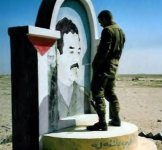Originally posted by fergy1370@Dec 14 2003, 11:59 AM
Good call Smack. 
Wonder how France, Germany, and Russia feels this morning.....?
In answer to your question, Fergy
Updated 11:25 AM ET December 14, 2003
By Richard Meares
LONDON (Reuters) - Worldwide jubilation Sunday at the capture of Saddam Hussein showed how friendless the fugitive Iraqi dictator was.
Even France, Russia, Germany and the world's most populous Muslim nation Indonesia, all fierce opponents of the U.S.-led war to oust Saddam, lauded his arrest by American forces who seized him Saturday without firing a shot.
Congratulations heaped on George W. Bush for the stunning coup thrilled the U.S. president, who called it an "enchanting day" and was due to make a public address at noon (1700 GMT).
World leaders said they hoped Saddam would now be brought to account for years of abuses against his own people and that his arrest would help calm Iraq, while cautioning it was unrealistic to hope peace would suddenly break out in the chaotic country.
"The moment has arrived for him to pay for his crimes," said Spanish Prime Minister Jose Maria Aznar.
Some leaders, especially those who opposed the war, said Saddam's arrest should speed the transition to a sovereign government and shorten the U.S.-led occupation of Iraq.
"This is a major event which should strongly contribute to the democratization and the stabilization of Iraq and allow the Iraqis to once more be masters of their destiny in a sovereign Iraq," said French President Jacques Chirac.
German Chancellor Gerhard Schroeder saluted Bush by telegram and urged greater efforts to mend the shattered oil state.
"Saddam Hussein caused horrible suffering to his people and the region. I hope the capture will help the international community's effort to rebuild and stabilize Iraq," he wrote.
Britain, Spain, Poland, Australia and other countries that backed the war and sent troops to Iraq hailed the capture.
Arab and Middle Eastern leaders who had opposed the war shed no tears for Saddam.
Gunfire crackled in celebration around Baghdad, across Iraq and in Kuwait, whose occupation by Saddam sparked the U.S.-led Gulf War in 1991.
In Afghanistan, talk turned almost immediately to the hunt by U.S.-led forces for Osama bin Laden, the al Qaeda leader who has evaded efforts to track him down for more than two years.
Saddam's arrest is a boon for Bush after bloody attacks on U.S. forces and their allies that have increased over the months since the former Iraqi leader's ousting on April 9.
The White House said Bush -- facing a reelection campaign next year -- was happy for the Iraqi people.
"The Iraqi people can finally be assured that Saddam Hussein will not be coming back," a spokesman said.
Bush's staunchest ally, British Prime Minister Tony Blair, was one of the first to confirm the arrest.
"This has lifted a shadow from the people of Iraq. Saddam will not be returning," he said.
TRIAL
Saddam had no close allies abroad and his arch foe Iran, whom he fought for most of the 1980s, joined in the call for the fallen dictator to pay for what he had done.
"Saddam should be prosecuted because of the crimes he has committed against the Iraqi and Iranian people," Vice President Mohammad Ali Abtahi said.
"Iranians have suffered a lot because of him and mass graves in Iraq prove the crimes he has committed against the Iraqi people. The...arrest of a criminal has made me very happy."
An Iraqi government to be formed by June will be free to re-establish the death penalty. Saddam made free use of execution, killing thousands during his years in power.
"We want Saddam to get what he deserves. I believe he will be sentenced to hundreds of death sentences at a fair trial because he's responsible for all the massacres and crimes in Iraq," said Amar al-Hakim, a Shi'ite political leader,
There were isolated voices of lament for America's key foe.
Azzam Hneidi, a Jordanian member of parliament and spokesman for the Islamic Action Front, said he was shocked.
"It's bad news. To us, Saddam was a symbol of defiance to the U.S. plans in the region. And we support any person who stands in the face of the American dominance," he said.
The invasion of Iraq failed to find weapons of mass destruction, Bush's main justification for going to war, and triggered a bloody guerrilla insurgency.
After Saddam's sons, Uday and Qusay, were killed in a gunbattle with U.S. troops in July, violence against U.S. forces increased rather than decreased as the White House had hoped.


 :
: 






